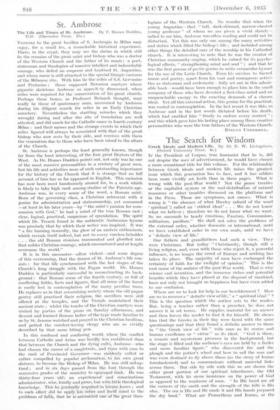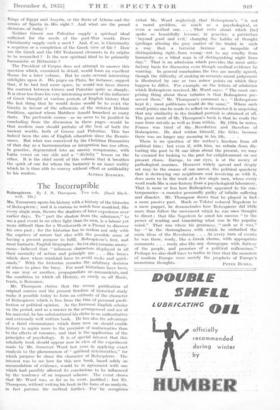The. Search for. Wisdom .
Greek Ideals. and Modern Life. By Sir R. W. Livingstone.
' (Oxford University' Press. as.) ' '
IF the President of Corpus, true humanist that he is, did not despise the uses of advertisethent, he would have chosen a More sensational title for this voluMe. For the relationship' between Greek ideals and modern 'life raises the greatest issue which this generation has to face, and it has seldom been more ,vividly set forth than in these pages. What is wrong with the post-War world ? Not the peace treaties or the capitalist system or the mai-distribution of natural. resources or other troubles discussed on the platform' and in the Press. These are symptoms, not' causes. What is' wrong is " the absence of what Huxley (afraid of the word ` spiritual ') called. an ' ethical ideal' . . .' We do not knoW what we believe ; therefore we do not know what we want: So we succumb to heady emotions, Fascism, Communism, militarism, pacifism." We shall not solve the problems of the external order, whether domestic or international, until we have established order in our own souls, until we have a ' definite view of life.'
Our" fathers and grandfathers had such a view. 'they were Christians. But today " Christianity, though still a living religion, and; even with those who reject it, a poWerfal influence, is no. longer the creed of Europe and* nothing has taken its place. The majority of men haVe exchanged the. certainty of faith for the twilight of opinion." This is the rooteause of the malaise of the post-War world. That is why science and invention, and the immense riches and potential benefits which they have placed at the disposal of mankind', have not only not brought us happiness but have even added to our confusion.
Where are we to look for help in our bewilderment ? How are we to recover a " definite view of life," a " spiritualideal " ? This is the question which the • author sets to the reader. But, being a teacher rather than a preacher, he 'does not answer it in set terms. He supplies material for an answer and then leaves the reader to find it for himself. He shows him that the Greeks in their day were faced with the same questionings" and that they found a definite answer to them in "the Greek View of life " • with man as its centre and human excellence or " virtue " as its ideal. " God is there, a remote 'and mysterious presence in the background, but the stage is filled and the audience's eyes are held by a frailer and more familiar figure," who discovered fire and the plotigh and' the potter's wheel and how to sail the seas and was even destined to-fly above them (as the story of Icarus foreshadowed) 'and to communicate without material links across them. But' side by side with this we are shown the other great portion of our spiritual inheritance, the Old Testament, with ita stern insistence on the power' of :God as opposed to the weakness of man. " In His hand arc all the corners of the' earth and the strength of the hills 'is His also. -.The sea is- His and He made it and His hands prepared the dry land." What. arc' Prometheus and Icarus, or the
Kings of Egypt and Assyria, or the fleets •of' Athens-and the armies of Sparta in. His sight ?. And what are the proud dictators. of today ?
. Neither .Greece nor Palestine supply a spiritual ideal sufficient for the needs of the post-War world. Does Christianity. supply such a need ? And, if so, is Christianity a negation or a completion of the Greek view of life ? How are the Greek and the Old Testament elements in its origins to be reconciled ? Is the new spiritual ideal to be primarily humanistic: or Hebraistic ?
The President of Corpus does. not attempt to answer this . question which, examined in detail, would form an excellent • theme for a later volume. But he casts. several interesting . sidelights upon it. His. pages on Plato, for instance, suggest that, if he had had more space, he •wouktInot have drawn the contrast between. Greece and Palestine quite so sharply. It is clear too from his very interesting account of the influence of Greek thought at various periods of English history that the last thing that he would . desire would be to evict the Greeks in favour of the adherents • of the strictest Hebraic tradition, 'against whom Matthew 'Arnold launched so many darts: The preferable course—so we seem to be justified in mneluding from the discussion in .these pages—would be that modern man should partake of the best of both the ancient worlds, both of Greece and Palestine. This has indeed been the aim of English education since the Renais- sance. But what was conceived by the Christian Humanists of that day as a harmonisation or integration' haS too often, in practice, degenerated into an uneasy compromise, with Latin verses on one side and a " divinity " lesson on the other. It is the chief merit of this volume that it breathes the spirit ..of one for. whom the harmony is an inner reality which he is thus able to. convey without effort or artificiality













































 Previous page
Previous page